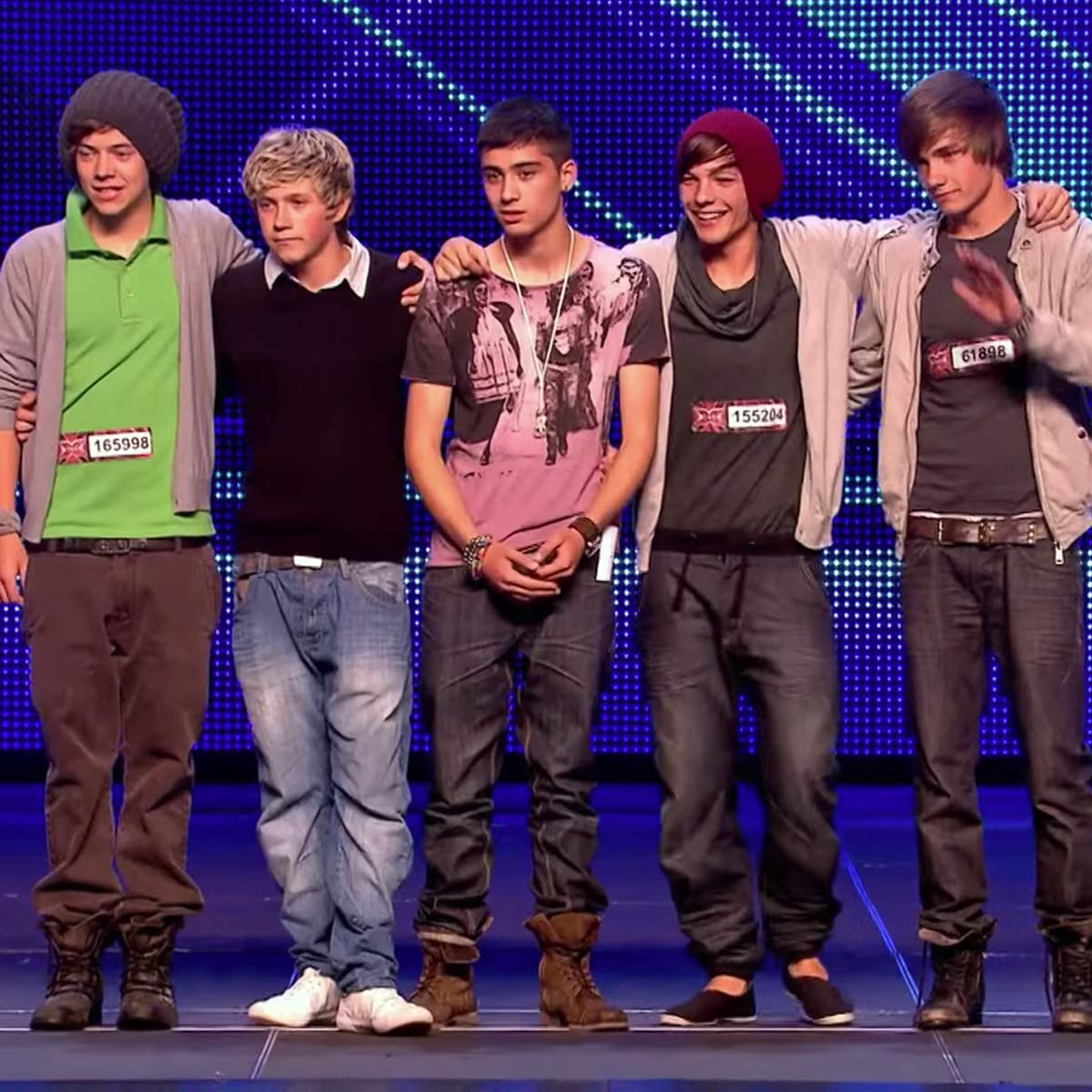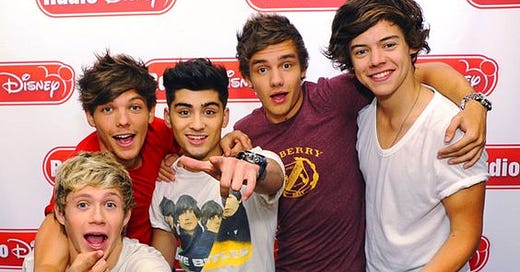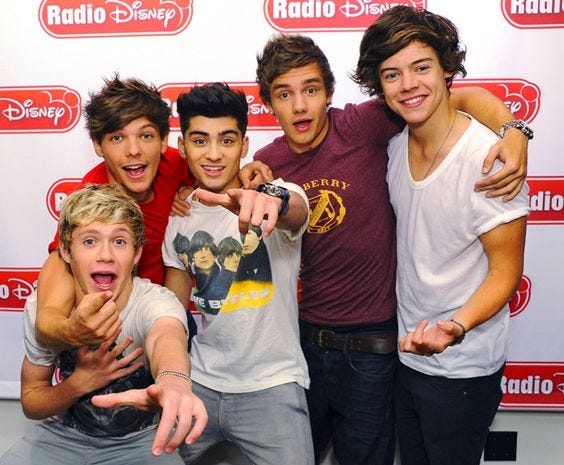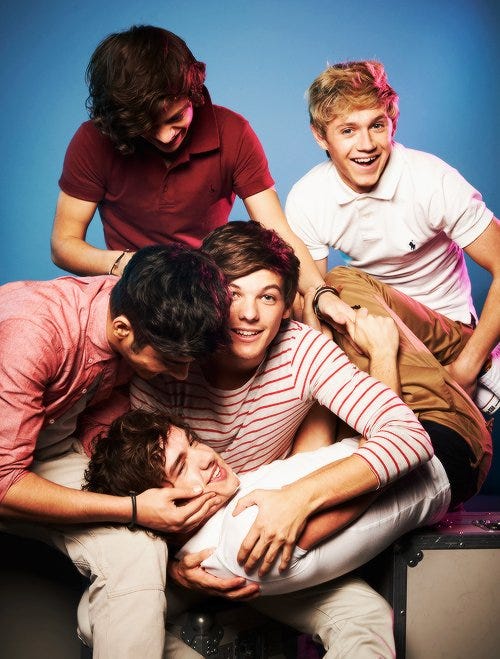On October 16, 2024, pop singer and former One Direction member Liam Payne died, after falling from a third-story balcony at a hotel in Buenos Aires, Argentina. Like millions of young girls and women worldwide, I was alerted of this news via a flurry of text messages. One of my friends sent me the news in a series of disjointed messages, each word occupying its own text so I would receive a surge of notifications, signaling me to check my phone immediately. After reading “LIAM” and “PAYNE” separately, something instinctually told me the next text would read “DIED.” And it did.
Liam occupied an odd space in the public psyche during his final days. Compared to other former One Direction members, who have gone on to forge quite disparate and successful solo careers, Liam had been clinging onto his boyband clout with a white-knuckled grip, and as a result, had become a bit of a laughingstock. Two years ago, he appeared on Logan Paul’s podcast, where he dished out past drama about the band, leaving out key details about which member “pushed him up a wall” and alleging that One Direction sprouted out of Simon Cowell’s personal promise to make him a star. At post-1D red carpet appearances, he was often roasted for what many identified as a botched buccal fat removal job. One week before his passing, he attended former bandmate Niall Horan’s concert, where he hammed in front of fans from his suite box, which was cringed at by former fans on Twitter and compared to Harry Styles’ more subtle attendee behavior several months prior.
In the days preceding his death, Liam’s ex-fiancé, Maya Henry spoke out about the abuse she faced from Liam on The Internet Is Dead podcast. Glimpses of this abuse are woven into Maya’s novel “Looking Forward,” a work of fiction inspired by true events. In the podcast episode, Maya alludes to Liam chasing her with an axe and threatening suicide to keep her close. All of these details soured the dwindling limelight cast on Liam Payne, causing him to waver between cringe-worthy and troubled, to abusive and terrifying.
Just days before his death, much of the discourse on my Twitter timeline revolved around Liam Payne. “When I say I stan One Direction, this is who I’m talking about,” one tweet read, featuring a photo of Harry, Louis, Zayn, and Niall, with Liam cleanly cropped out. Many joked that Liam would inevitably create a One Direction recap podcast one day, where he would rewatch old videos of the band for extra cash, like so many has-been childhood actors do. The one-liners ranged from lighthearted gags to condemnations. But the flow of content was sharply dammed and diverted following his death. Former fans cracking jokes were now thrust into mourning, others rejoicing on Maya Henry’s behalf, and most others falling somewhere in the middle.
It’s hard not to color death with darkness any way you slice it; Liam’s is no exception. Sources reported that his toxicology report found crack cocaine and methamphetamine in his system before he fell. Leaked photos from his hotel room showed smashed screens and drug paraphernalia. He’s leaving behind his seven-year-old son Bear. The death is first and foremost a personal tragedy for Liam’s immediate family and friends. As a former One Direction fan, what I’ve been able to observe most closely in the aftermath is the complications of grieving not necessarily a person, but a persona.

Very few people share the experience of becoming a truly overnight sensation like One Direction did. In 2010, the five members auditioned for the British singing competition show, The X Factor, as solo acts. Deciding that the teenage boys would be more powerful as a fivesome, judges Simon Cowell, Nicole Scherzinger, and Louis Walsh arranged them into a singing group. The boys’ ages ranged from 16 to 18 and there was this sense that their auditions were real shots in the dark. They spoke about the towns they came from, their plans to go to college, and how their families had always told them they were swell singers. There was this real “Why not?” attitude underscoring their singing endeavors - the show was passing through their town for auditions, so they might as well show up, each singing with shaky voices and hands in front of the entire UK. It’s clear that none of them imagined becoming the kinds of artists that sell out stadiums.
The lack of calculation and humility is what endeared One Direction to millions of fans. During The X Factor, video diaries of the boys sitting on a staircase and recounting their weeks were uploaded to YouTube. From these videos sprang inside jokes among the boys and their followers, jokes that would be recounted among fans online and between One Direction and their supporters at meet-and-greets for the better part of a decade. They were unable to behave in interviews, always laughing maniacally and responding to interviewers with heavy teenage sarcasm. Compilations of “One Direction funny moments” abounded on YouTube. After school every day, I ran straight to my bedroom to log online and see what the band was up to - rewatching interviews and compilation videos that I can still quote by heart to this day.
One Direction had a pure and youthful persona that made them appear approachable to young girls. They weren’t glamorous celebrities, but cheeky teenage boys, the kind that kick your chair in class, that never have a pencil on them. Millions of young girls, like myself, developed parasocial attachments to them, deluding themselves into believing they might like them - might even want to date them - if only they could grab their attention.
During especially difficult points in my childhood, the delusion of One Direction is what kept me sane. Rewatching videos again and again, communicating with other fans online, reading fan fiction - it all helped muffle creeping anxious and depressive thoughts. The family squabbles and slammed doors. The delusion of One Direction wasn’t just a romantic fantasy, even though they were engineered to appear like perfect boyfriends to young girls. One Direction was an entire world I could escape into when I opened my computer. They were an innocent, smiling lifeboat that I clung onto for dear life.
When the group announced a hiatus in August 2015, just months after Zayn had quit the band, it was met with sadness, but also reverence and a hope that the group would one day share the stage again. They might not be the energetic, silly teenagers of the early 2010s (they all had facial hair and deep voices now) but perhaps they would tour together once again for old times’ sake. "Ok so Lots of rumours going round," Niall tweeted, following the hiatus announcement. "We are not splitting up, but we will be taking a well earned break at some point next year.”
The verbiage surrounding the band dissolving was quite careful - One Direction and their team clearly knew the stakes of dismembering a fixture of hope, happiness, and sanity for so many young people. Every move the boys made left a mark on millions (when a video of Zayn and Louis smoking weed leaked in 2014, my naive mind worried they were steamrolling toward hard drug addiction). The trouble with developing millions of parasocial relationships is that those relationships still require careful management - even if they aren’t fully requited, or even based on the full truth.
In the nine years since One Direction announced their hiatus, all members have gone on to explore solo projects, which many of the fans have supported. But for a long time, there was still this sense of waiting - of fans sitting and staring at the front door like a dog, waiting for their favorite boyband to return home. Every small thread of connection sparked between the boys - them attending each other’s concerts, mentioning the other members in interviews - was met with a wellspring of online commentary and speculation. Many - myself included - were clinging to the hope that the “hiatus” wasn’t an indefinite “goodbye,” but a “see you later.”
But Liam’s death has brought forth a true reckoning. Fans are not just forced into mourning a beloved idol's passing, but must also process the demise of a long-held delusion. Beyond the tragedy of the death itself, the darkness surrounding it - the likely substance abuse, the alleged domestic abuse, the seemingly accidental nature of the death - it all colors the sunshine memories of One Direction in a somber tone. The hope of One Direction ever reuniting is permanently quelled, the carefully crafted promise is broken. The situation can’t help but feel like another unfortunate lesson about the troubles that come with fame, and acquiring so much of it so young.
Time will pass and black and white will turn back to color. We’ll be able to stream and rewatch with pleasure once again, in memorium and in delight. But for now, fans will temporarily confront a more personal kind of loss - the passing of time itself. I was in eighth grade when Zayn announced he was leaving One Direction - I got home from middle school and cried until my eyes were bloodshot. That was its own kind of loss - the kind a middle schooler can more easily process. Today, as a young adult who’s since experienced more perverse tragedies and grown increasingly weathered - soft edges refined with sandpaper - receiving the news of Liam’s passing while working from home on a Zoom call was an ice bath-shock reminder that I’m no longer a kid. That Santa Claus isn’t real and hopelessness can no longer be curbed with a One Direction funny moments compilation. We - the fans, the band, all of us - had to grow up eventually.






